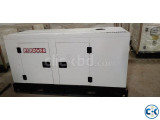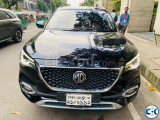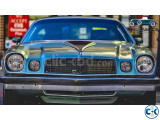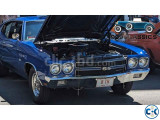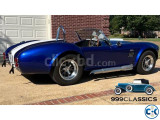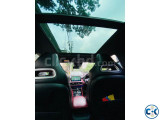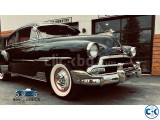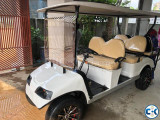My ClickBD
Brand New Ferrari F430 Spider
Lowest price in Bangladesh:
Highlights
- New/Used: new
- Year: 2008
- Model: Ferrari F430 Spider
- Color: black
- Mileage: 100
- CC: 4500
Seller info
Sold by:
Fahim Rahman
Member since:
22 Oct 2013
Location:
Dhaka Khilgaon
Safety tips:
Don’t pay in advance
Meet in a safe & public place
Meet in a safe & public place
Description
DESCRIPTION for Brand New Ferrari F430 Spider price in Bangladesh
|
Please note: you must deposit 1.5 Cr for booking price. or must have a good family/business background. PLEASE DONT DISTURB IF YOU DONT WANT TO BUY. name:Ferrari F430 Spider model:2008 colour:black C C:4500 ***Original Photo Uploaded*** New from showroom. You will get all the original parts which comes with new purchases. Our showroom: Karib Auto LTD 106/1,kakrail,Dhaka-1000,Bangladesh contact number: +880167-700-1199 Technical features:The F430 Spider is powered by the 90' V8 featuring Ferrari's traditionally uncompromising design approach with a flat-plane crank (180' between throws). This is an all-new unit that does not share any components with the 360 Spider's engine. The improvement in terms of performance, weight and reduction of overall dimensions is yet another result of Ferrari applying its wealth of F1 experience to its road cars. Despite a 20% increase in engine displacement over the 360 Spider's power unit (from 3586cc to 4308cc), engine weight has grown minimally by just 4 kg, while performance is considerably improved across the board. Torque has increased by 25% (465 Nm at 5250 rpm, 80% of which is already available at 3500 rpm) and power by 23% (490 hp at 8500 rpm). The engine is extremely compact with a cylinder spacing of just 104 mm. Similarly, Ferrari's engineers integrated the sump and main bearings in a single casting which, along with a smaller diameter twin-plate clutch and flywheel, has reduced the engine height between the bottom of the oil sump and the crankshaft to just 130 mm (from 145 mm on the 360 Spider power unit). The intake manifold features straight inlet tracts to the two central plenums which, in turn, have trumpets individually cast at the top of the tracts for each cylinder to ensure optimum air flow to the cylinder heads. A rotating drum - actuated pneumatically by the engine control unit ' compensates for variations in the effective volume inside the two plenums to optimise the intake resonance characteristics and therefore maximise the torque curve throughout the rev range. The set performance targets were achieved thanks to unrestricted intake and exhaust ducts for optimum gas flow efficiency and the high compression ratio (11.3:1). One of the technical features that sets the F430 apart is the E-Diff or electronic differential. This solution has been used for years in F1 single-seaters and has been continuously developed and refined, effectively transferring massive torque levels to the track under extremely high cornering g-forces. The E-Diff is now standard equipment on the F430 - the first time that a production car has been equipped with such a sophisticated system for high-performance roadholding. The F430 Spider features a new cast aluminium transmission casing that houses the gearbox in unit with the electronic differential and bevel type final drive, as well as the engine oil tank. The 6-speed gearbox incorporates multicone synchronizers, while both the 6th gear and the final drive have been lengthened to make the most of the greater power and torque of the new engine, and to guarantee reliability. The F430 Spider is available with either the classic Ferrari open-gate manual gearbox or with the F1 paddle shift that Ferrari has continuously developed and refined over recent years for its road-going berlinettas. Just like in Formula 1, the F430 Spider driver can change various areas of the set-up of his car using a single selector set on the steering wheel. The manettino, as it is called by Scuderia Ferrari drivers, is a rotary switch that has been adopted directly from racing, where total commitment to driving requires maximum efficiency and speed in controlling the car's various functions. This switch quickly and simply controls the electronics governing suspension settings, the CST stability and traction control, E-Diff and the change speed of the F1 transmission, as well as the integration between each of these individual functions. The manettino is located on the steering wheel and is an example of the rationalisation studies that went into positioning all the controls inside the car. The manettino enables car settings to be changed to suit personal preferences, road surface conditions and available grip. The settings available to the driver have been concentrated in five different levels. The F430 Spider features Ferrari's uncompromising forged aluminium, double unequal-length wishbone suspension set-up front and rear with anti-dive and anti-squat geometries. It also boasts new-generation software for managing the car's adaptive suspension to provide the perfect balance between handling and comfort. Two sensors are mounted on the lower front wishbones to read suspension travel, two on the upper shock absorber mounting points to measure body movement, one on a rear shock absorber mounting point to measure roll and yaw, and a last sensor on the steering column to measure steering angle. The control logic adjusts the shock absorbers' damping characteristics within a certain range based on the settings selected by the driver using the manettino on the steering wheel. The wheels are fitted with 19'' rims with 225/35 tyres at the front and 285/35 at the rear. There is also the option of run-flat tyres combined with electronic pressure control. When flat, these tyres can be driven for 120 km at a maximum speed of approximately 50 mph. The chassis of the F430 Spider fully exploits cutting-edge aluminium technology. As with the 360 Spider, the first Ferrari built entirely from aluminium, the F430 Spider's chassis is constructed at the Scaglietti facility in Modena in collaboration with Alcoa. The choice of aluminium and the design methods used have enabled two main objectives to be achieved: considerable structural stiffness, and excellent driver and passenger protection with minimal weight. The spaceframe chassis consists of a mix of aluminium extrusions, panelling cast nodes and has been completely revised using finite element analysis to further reinforce key areas. Chassis rigidity, which is indispensable for optimal handling, has been increased by 10% in terms of torsion and by 5% in terms of flexure. To offset the loss of the hood, the Spider's chassis has been significantly reinforced. The sill members have been strengthened with extremely light, rigid aluminium foam inserts where they connect to the rear B-post chassis members. Similarly, at the front the sill members are strengthened by a robust connection with the A-posts which include the Ferrari-patented integral door mounting points and the base of the windscreen surround. Particular attention was focused on studying the air flows in the cockpit to ensure that the F430 Spider would be as comfortable for occupants with its hood down as up. Experimental techniques and fluid-dynamic calculations were used to establish the distribution of the loads and velocities on the occupants. This in turn led to the definition of the dimensions and position of the wind deflector to ensure optimal comfort in terms of wind and noise. |

